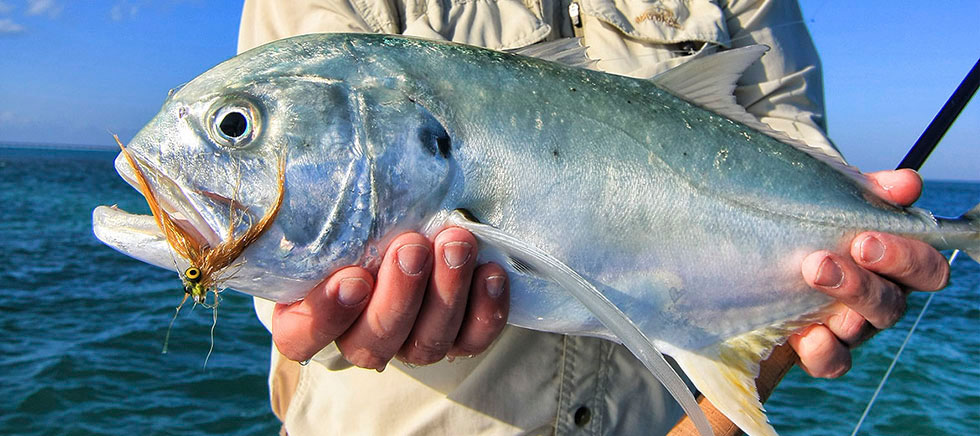Fly Fishing For Jacks
“Jacks are a trash fish that steal flies from tarpon.” We roll our eyes every time we hear this. Obviously, this person has never caught a jack.
Jacks are a species of hard fighting fish that aggressively take flies, in fact, they aren’t even picky about the fly. Jacks are related to GT and fight like them too. Both fish are a part of the Caranx Genus, making them a bit more than just a distant relative. They are recognizable by their distinct lighter color, black dot on their gill and yellow tint, jacks are not just pissed off predators that pull. Jacks are mainly reef dwelling but they feed on the flats, follow sharks and rays looking for an opportunistic meal and they also like structure in bays and canals. If the tarpon fishing is slow and you don’t know what to do, look no further than the jack.
With the unfortunate nickname of poor-man’s permit Jacks are opportunistic feeders, eating any unlucky bait fish that swims in front of them. These fish are found pretty much wherever tarpon are, from Florida to South America, and as far west as the west coast of Africa. They are both reef and flats fish and easily found almost everywhere.
These fish get GT sized as well, growing up to 70 pounds, the IGFA world record for all tackle is 66 pounds in Angola. Western Africa is know for big fish and outstanding fly fishing. Every few years a photo of giant tarpon (sometimes a world record) and giant jacks are seen there. So if you are feeling ambitious, there might be a world record for you out there. The other cousin to the Atlantic jacks, the pacific crevalle, can be found swimming alongside roosterfish. Almost identical in appearance, these fish behave the same way as their Atlantic counterparts. Many people consider these two fish one in the same.
 For flies, throw baitfish patterns, poppers or anything bigger than an inch and strip as fast as you can. Just like a GT or roosterfish, they like the chase. Larger jacks can swim in deeper water than juvenile fish, making larger jacks scarce on the flats but they do show up. However, all jacks eat shrimp and crabs when the going gets tough, so don’t be surprised if one eats your permit fly because they will. Especially if you are casting to permit following a ray or a shark, there are usually jacks there too waiting to take the offering.
For flies, throw baitfish patterns, poppers or anything bigger than an inch and strip as fast as you can. Just like a GT or roosterfish, they like the chase. Larger jacks can swim in deeper water than juvenile fish, making larger jacks scarce on the flats but they do show up. However, all jacks eat shrimp and crabs when the going gets tough, so don’t be surprised if one eats your permit fly because they will. Especially if you are casting to permit following a ray or a shark, there are usually jacks there too waiting to take the offering.
From a physiological perspective jacks are required to eat a lot and often. Research discovered that jacks digest their food so fast that it was unrecognizable in less than five hours. Transit time of food through a human digestive tract is about five hours and in a shark its about 48 hours. This might explain why they are always on the prowl for a meal and ever so happy to eat your fly.
However if you are looking for a good time which most times we are, throw on a surface fly. Nothing is quite as exciting as watching a jack get on top of the water to take down a big foam popper. Some people enjoy as much as tarpon fishing, we certainly do.
These fish are so much fun that it makes traveling around the world to catch GT somewhat questionable. Anglers can get a taste of giant trevally, well at least their cousins without the expense. Give jacks a try, you won’t be disappointed.




